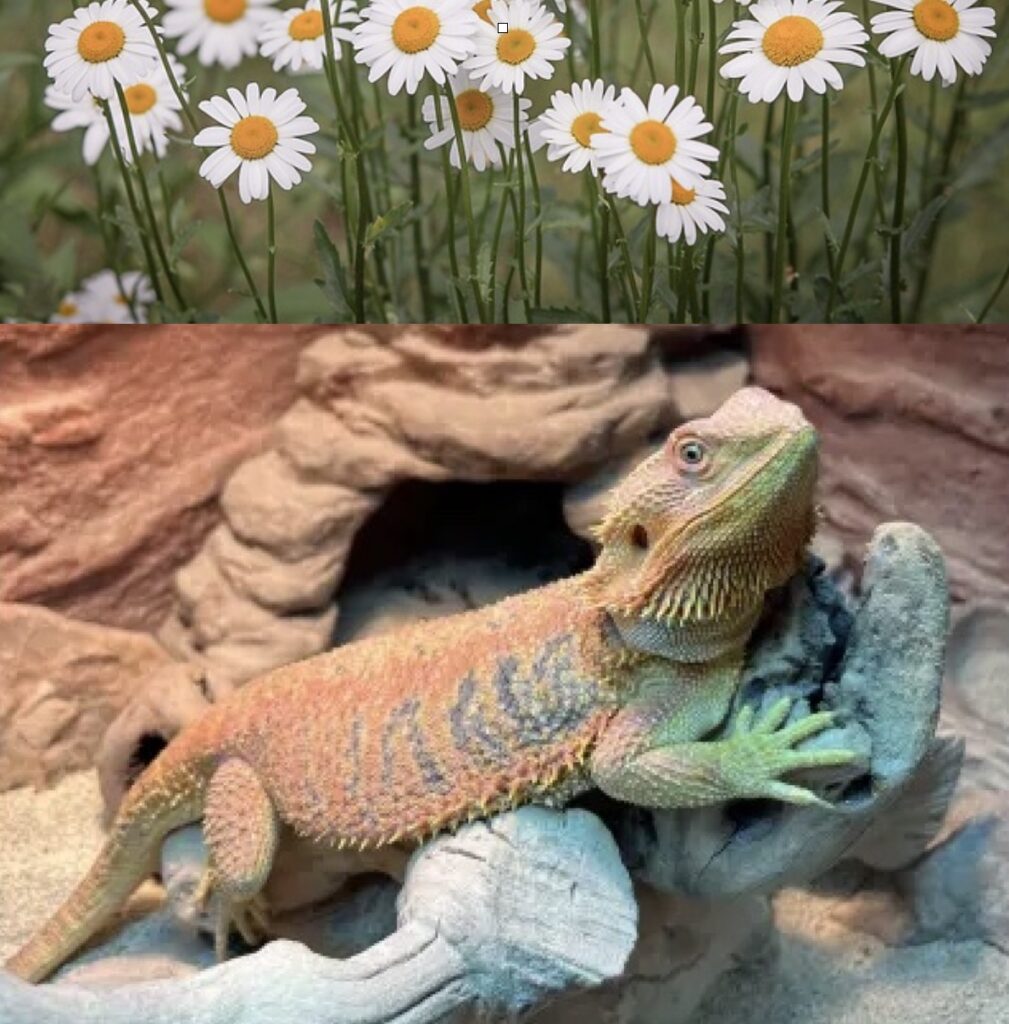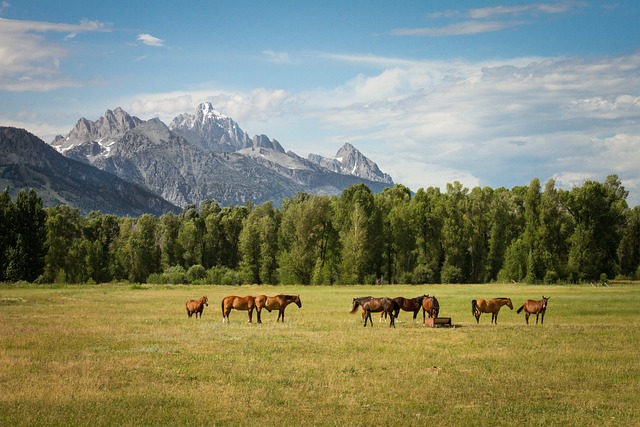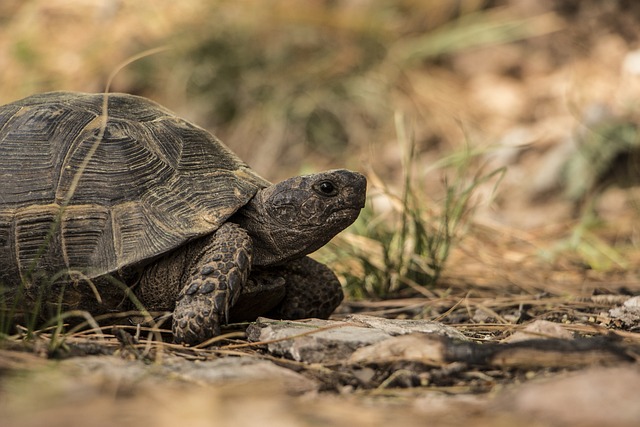If you’re wondering “can bearded dragons eat daisies?” the answer is yes! You can feed bearded dragon daisies in moderation, and many beardies love the taste of daisies.
In this article, we’ll explore the nutritional value of daisies for bearded dragons and how to feed them properly. As well, see our full guide to what flowers bearded dragons can eat here.
Can bearded dragons eat daisies?
- Can bearded dragons eat daisies?
- Nutritional Value of Daisies:
- How to feed daisies to your bearded dragon:
- How often should you feed your beardie daisies?
- Possible risks to feeding daisies to your bearded dragon:
- Foods bearded dragons can eat:
- Getting your bearded dragon calcium:
- Vegetables to feed your bearded dragon:
- Insects to feed your bearded dragon:
- How often should you feed a bearded dragon?
- What should a bearded dragon not eat?
- Frequently Asked Questions (FAQ):
- Recap: Can bearded dragons eat daisies?
Nutritional Value of Daisies:
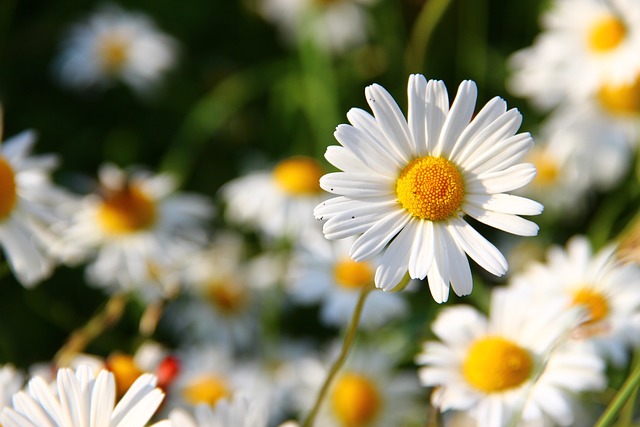
Daisies, otherwise known as Bellis perennis, are known to contain:
- Iron
- Calcium (very important for bearded dragons)
- Vitamin A
- Protein
*It’s unclear how well bearded dragons digest daisies, more on that below.
How to feed daisies to your bearded dragon:
- Make sure to clean the daisy. While it’s unlikely pesticides are on the daisy, some contaminants from nearby flowers could have traveled onto it.
- Cut off the stem.
- Rip up the daisy petals and sprinkle in the salad or insect mix you feed your beardie.
How often should you feed your beardie daisies?
A good rule of thumb is a few petals (no more than two or three) sprinkled into their food once a week.
Possible risks to feeding daisies to your bearded dragon:
It’s unknown how well bearded dragons digest daisies. Although it poses no real risk to them, it isn’t a food source they’re particularly drawn to in the wild. We have to trust that their bodies know what is good for them, so stick to a diet mainly consisting of insects and fresh plants, with some fruits thrown in here and there.
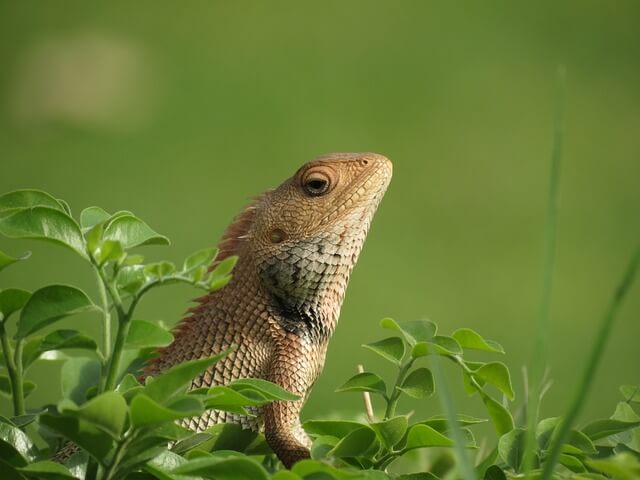
Foods bearded dragons can eat:
If you’re wondering what you should feed a bearded dragon, read our guidelines below. Bearded dragons are insectivores, which just means they thrive on insects as well as plant materials.
If you have a juvenile bearded dragon (between six and eighteen months old), give them about 80% vegetables and 20% live insects.
As your bearded dragon transitions into adulthood, give them the inverse, so 20% plant materials and 80% insects.
Getting your bearded dragon calcium:
Calcium is especially vital to a bearded dragon, especially a young one that is still growing. There are several ways to introduce more calcium into your beardie’s diet:
- Add in more high calcium vegetables like dandelions, bok choy, and collard greens.
- Dust calcium powder over their insects and vegetables to increase calcium levels.
- Make sure they’re getting their 12 hours of UVB exposure as they need this light to be able to properly absorb nutrients.
Vegetables to feed your bearded dragon:
- Peas
- Dandelion
- Green beans
- Cabbage
- Zucchini
- Pumpkin
- See our full list of vegetables to feed your bearded dragon
Note: Bearded dragons can also eat fruit in moderation. See here for a complete list of fruits bearded dragons can eat.
Insects to feed your bearded dragon:
- Crickets
- Kingworms
- Waxworms
- See our full guides to insects you can feed your bearded dragon and worms to feed your bearded dragon
Quick note: Live insects raised by you or bought from the pet store are best because they’re definitely pesticide free.
How often should you feed a bearded dragon?
During the first 3-6 months of your beardie’s life, try to feed them four to five times a day by giving them as many insects as they’d like in 10 minutes. They’re growing and need lots of protein during this stage.
Reduce the number of feedings to about two to three times a day when they’re growing into their juvenile years (between six and eighteen months).
As they become an adult, you can feed them once daily.
What should a bearded dragon not eat?
Avoid feeding your bearded dragon:
- Onions
- Leeks
- Chives
- Mushrooms
- Garlic
- Acidic fruit like oranges, lemons
- Rhubarb (can be toxic to them)
- Avocados (surprisingly, these make them ill)
- Eggplant
- Insects caught in the wild (there may be pesticides covering them)
- Venomous insects
- Dairy of any kind
- Rice and grains of any kind
- Frogs or toads
- Ham or other processed meats
Frequently Asked Questions (FAQ):
Can bearded dragons eat buttercups?
No, do not feed your bearded dragon buttercups, as it is toxic to them and will interfere with their digestion.
Can bearded dragons eat grass?
While bearded dragons can eat grass, they shouldn’t eat too much of it. See our article on bearded dragons eating grass for more details.
Can bearded dragons eat forget me nots?
Yes, although it’s best to feed them forget me nots in moderation, it has low nutritional value to them.
Can bearded dragons eat black eyed susans?
Yes, bearded dragons can eat black eyed susans, but only as a treat and only in moderation.
Are daisies edible flowers?
Yes! Daisies are edible and used in some cuisines in the world. They taste slightly bitter with a slight kick of spice.
What parts of a daisy can you eat?
You can add the flower head and petals of a daisy to your food. Some people use them as an herb in their cooking to add an aroma to their soups or salads.
Are daisies toxic to pets?
Daisies are mildly toxic to many breeds of dogs and cats, but in small quantities are fine to feed to a bearded dragon.
Are wild daisies safe to eat?
Yes! Wild daisies are safe to eat, just make sure you wash them thoroughly to get rid of any possible pesticides or contaminants that might be dangerous to you or your bearded dragon.
Can Shasta daisy be eaten?
Yes! Shasta daisies can be eaten, but they do have a strong taste you might not like.
Recap: Can bearded dragons eat daisies?
- Yes! Bearded dragons can eat daisies, and many thoroughly enjoy eating it.
- It’s best to keep daisies to a weekly treat, as it’s unclear how much nutritional value beardies get from this flower.
- Stick to their normal diet of insects plus plant matter.
For our full list of food to feed a bearded dragon, see our guide here.
Related articles:

